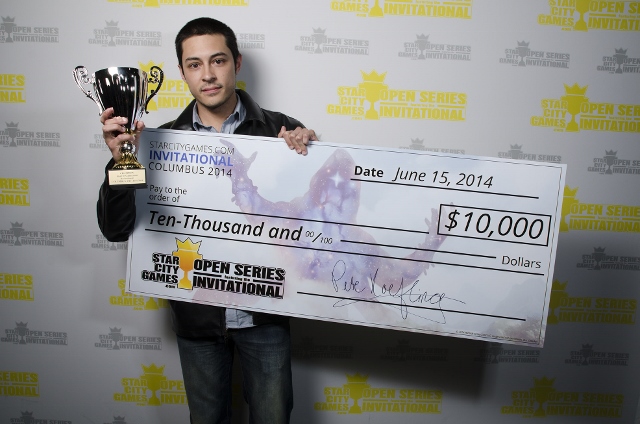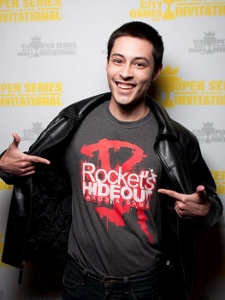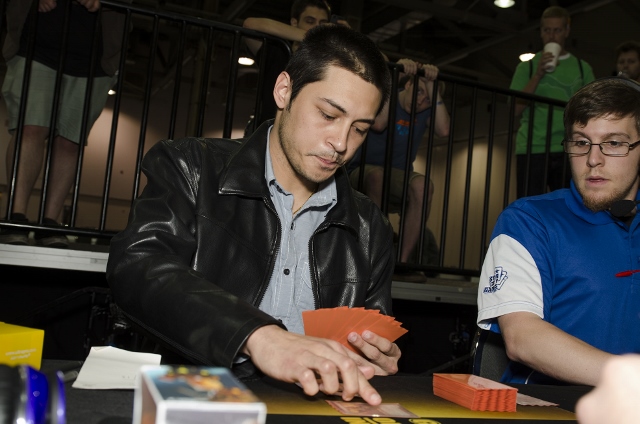Tom Ross was coming off a 6-2 finish in Standard on Day Two of the Season Two Invitational in Columbus, Ohio when he expressed how ready he was for Legacy. His Boss Sligh deck was strong, tuned, and quintessentially him. He had just defeated an Esper Control player in two quick games – the first of which ended before he could untap for turn four and the second a few turns later after he attacked through an early Nyx-Fleece Ram and a Supreme Verdict. Even still, he didn’t have much to say, passing his deck off as “good.”
The two match losses in Standard left him very little wiggle room in the Legacy portion of the event, and he wasn’t entirely satisfied with the deck’s performance. Ross navigated the final four rounds of Legacy on Day Two to reach the Top 8 and earned another chance to show off the power of his hyper-aggressive Standard deck on Sunday.
And did he ever.
Ross annihilated his opponents in the Top 8 with blazing fast wins against Brad Nelson, Alex Bertoncini, and Ben Friedman. He won his matches 3-0, 3-0, 3-1 with each match taking less than thirty minutes where more time was spent shuffling and sideboarding than actually playing the games. The man nicknamed “The Boss” won the Invitational faster than any previous champion, and he did it after describing his winning deck in one word, not wishing to expound on the extreme archetype he put to good use. The Boss, humble as always, downplayed his deck a day before and quietly won the tournament showing almost no emotion, saying very little, and just letting his play speak for himself.
Days later, after enjoying a celebration at his hometown game store, Rocket’s Hideout in Baton Rouge, Louisiana, Ross still spoke swiftly, not one known to brag or use hyperbole.
“I’m happy,” Ross said. “It really hasn’t hit me yet, but the win is more than just a check. I’ve wanted this token for so long and it feels great to know it is happening.”

Tom shows off his Invitational winnings.
Ross has had dreams of getting his own token since he returned to Magic from a break in 2005. He opened a booster pack of Mirrodin and saw a Murray Evans token inside. Evans was a player Ross considered a peer of his and from then on he knew he wanted one of his own. Even though Wizards of the Coast stopped putting players on tokens before Ross could get a chance to get his likeness on one, he got a second chance when StarCityGames.com started making exclusive tokens for the winners of its Invitational tournaments in 2013.
Like most Magic players, Ross started long ago and has taken breaks from the game. But each time he came back with a fire and a new perspective on the game. He started in Ice Age, won his first PTQ on his eighteenth birthday in New Orleans for Pro Tour New Orleans in 2001, and reached the Top 8 of Pro Tour Honolulu in 2009. His breaks came from when he went to college at Louisiana Tech in Rustin, worked as a video game designer in Shreveport, and worked in the casino business to learn the gaming industry from the inside.
“After every break, people come back with a different outlook on the game that helps them,” Ross said. “All my breaks, jobs, and schooling have helped me look at the game from different angles and have helped me in terms of thinking about the game in general.”
With Ross’ Invitational win he has his token locked up and on the way. While he considered having his token be a 1/1 red soldier with haste, the token generated by Akroan Crusader – a four-of from his Boss Sligh deck – Ross decided on having his likeness immortalized on a special poison counter. It’s fitting for the most notable Infect player on the Open Series who has taken it to many strong finishes in Legacy, but also has brewed a version of it in Modern.
 Much like Infect in Legacy, Ross has made his name by playing insanely aggressive and extreme strategies in all formats. In his player profile for the Invitational, Ross made note that players don’t respect extreme strategies enough. That lack of respect allowed Ross to cruise through the Top 8 with his twenty-one-drop Standard deck that goes under whatever his opponents are doing. His deck choice was perfectly situated for the Invitational, where he was often presenting lethal damage before his opponents were deploying threats to the board. Boss Sligh was tuned specifically for the metagame flooded with the latest top-performing decks.
Much like Infect in Legacy, Ross has made his name by playing insanely aggressive and extreme strategies in all formats. In his player profile for the Invitational, Ross made note that players don’t respect extreme strategies enough. That lack of respect allowed Ross to cruise through the Top 8 with his twenty-one-drop Standard deck that goes under whatever his opponents are doing. His deck choice was perfectly situated for the Invitational, where he was often presenting lethal damage before his opponents were deploying threats to the board. Boss Sligh was tuned specifically for the metagame flooded with the latest top-performing decks.
“I want to play a deck that beats the best deck and also beats the deck that beats the best deck, so for the Invitational it was Jund Monsters and Mono-Black Devotion, but also U/W Control which can beat those,” Ross said. “I like to present a lot of threats, but also complicated threats. A lot of people see Magic as a puzzle to be solved and I like to be the guy making the hardest puzzles for them.”
Ross’s theory for creating and playing decks comes down to two principles: applying pressure early and being able to win in all stages of the game. His dislike for control decks comes from them only being able to reliably win in the late game… while his decks can put the pressure on immediately to win games early, steal one in the middle stages of a game, or pick away until he has a window to win in the late game. His Legacy Infect build is a perfect example of a deck that fits his style. The deck can win on turn two with the nut draw, but usually wins in the midgame after fighting through disruption. Even if the game runs long, the deck has the tools to hang on until he can steal the match.
“A lot of strong players, especially in something like the Invitational, like to win in the late game and I attack that mentality,” Ross said. “People are afraid to put all their eggs in one basket like this. Once I picked up small creatures and winning rounds quickly back in Extended, I was in. Creatures are a little weaker these days, but if you play enough of them they’ll get the job done.”
While Ross compares his Boss Sligh deck to putting all of his eggs in one basket, Brad Nelson sees it another way. The former Player of the Year and good friend of Tom’s has seen him play similar decks and strategies throughout his entire career. The two met at Pro Tour Houston in 2002 and quickly became friends.
“Tom is not afraid to play decks that don’t have any power curve. He will be able to utilize many resources that are underpowered to better effect than anyone else. He can take decks that have an unbelievably long spiderweb of decisions that you have to make on turn one and two, especially on the draw, and know how the games are going to play out and use his spells perfectly,” Nelson said. “He is best at low resource-management and getting all the value out of his cards, understanding what role they need to play individually, and finding a way to win using all these little moving pieces to get to the endgame of killing the opponent.”
Unfortunately for Ross, his quarterfinals opponent was none other than Brad. Though he wished he could have met the Indianapolis Invitational winner in the finals, Ross said that neither of them really cared who won the match, just that whoever did had better win. Nelson was playing Jund Monsters, a deck Ross had built his deck to beat, and Ross routed him in a match that was never in question.
Just because their match was over didn’t mean the two were finished. Nelson immediately grabbed a marker and proxied his deck to match Ross’ semifinals opponent and was ready to jam games until Ross had to play again. The two spent the next hour or so practicing so Ross had the best chance possible of reaching the finals.
“That was the fastest I have ever turned around from being knocked out of a tournament to being one hundred percent fine with it. Within five minutes of losing to Tom, my deck was changed to Bertoncini’s 75 and I was ready to help him win his next match,” Nelson said. “He is one of my best friends and there was nothing I could do at that point to win the tournament, so I was ready to help him and watch him crush the rest. We were playing games for his semifinal matchup ten minutes after the quarterfinals were done.”
Ross beat Bertoncini’s Jund Monsters deck, built seemingly better for the matchup than Nelson’s was, even faster than he defeated Nelson the round before and entered the finals with a perfect record of 6-0. Friedman was able to steal a game in the finals with his B/W Midrange deck, but Ross took the match soon after by attacking with a Rakdos Cackler suited up with a Madcap Skills and pumped by a bloodrushed Rubblebelt Maaka and a Titan’s Strength. That sequence represented exactly what his deck was capable of, by pushing through eleven points of damage in one turn after fighting through a plethora of removal spells up to that point.

The Boss makes a play in the finals of the Invitational.
Ross celebrated his Invitational win with Nelson, who he can thank for his nickname. Nelson was a big supporter of Ross early on and began making sure everyone knew what to call him, even going as far as squeezing his name into his articles. Ross even remembers when Nelson broadcast it to the world and put The Boss into the mainstream.
“Brad is an outspoken dude and we were at a tournament a long time ago, where GGs Live was doing coverage, and those were the Wild West days of coverage where they just let anybody do it,” Ross joked. “I was in a feature match and Brad walks over and jumps in the booth and starts doing commentary and talking me up. Everyone knew him but didn’t know me. So he went in and promoted me and made sure to spread the word.”
Winning the Invitational meets Ross’ goal of getting his own token, but also makes Ross’ name one to know, especially as the Open Series continues on toward the end of the year Players’ Championship he is now qualified for. The finish also follows his Top 8 finish in the Season One Invitational in Charlotte just three months earlier. He looks forward to being able to give family members the token to show what he has accomplished, and knows he will be signing them in the future to go along with the Akroan Crusaders he has already been asked to autograph. His next goal, however, is a bit bigger.
“Making my token was my biggest goal, now the next is to get into the Hall of Fame. It’s quite the difference in orders of magnitude between those two, but I got the first one and now I can work on the second,” Ross said. “I’ve come back to Magic and seen a lot of players I considered my peers put in a lot of hard work and make it, and I think there is no reason I can’t do the same. I’d also like to get into the Community Cup. I think I do a lot for the community and can do more. I like making these budget decks, practicing what I preach, lowering the barrier of entry fees to formats for a lot of people. I am down for whatever gets more people playing the game.”
For those close to Ross and who grew up playing Magic with him, this achievement doesn’t come as a surprise. Fellow Louisiana player Tannon Grace cut his teeth playing competitive Magic at the same time Ross was tearing up events in the state. Grace recalls back when the strongest players hailed from Baton Rouge and Ross at the time was traveling to events from other parts in the state, always coming out on top and often eliminating Grace from PTQ finals appearances. In fact, Grace credits Ross for being the reason he hasn’t played on more Pro Tours than he has.
Grace was quick to notice Ross’ success in the state and started paying attention to him after local players would call him lucky. After a while he befriended Ross and saw that luck had nothing to do with things.
“I kept watching him play and it was apparent, this guy doesn’t get lucky, he’s just really good,” Grace said. “His Invitational win has been a long time coming. He always thinks about the game differently. Tom always challenges common thought and challenges you do to the same otherwise you got left in the dust.”
